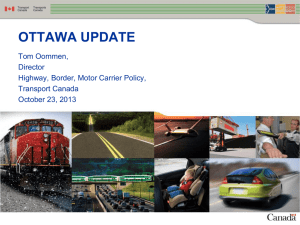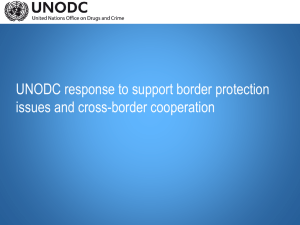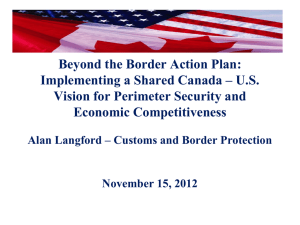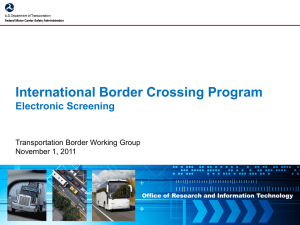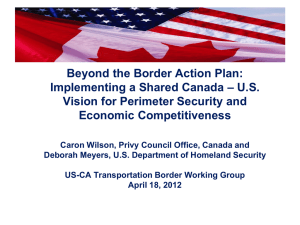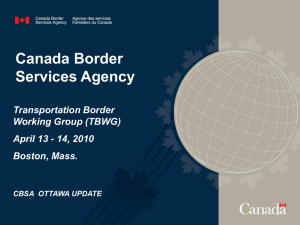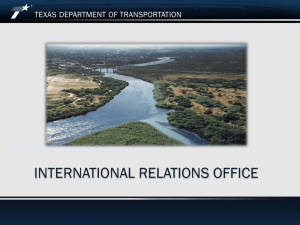Border Infrastructure Investment Plan
advertisement
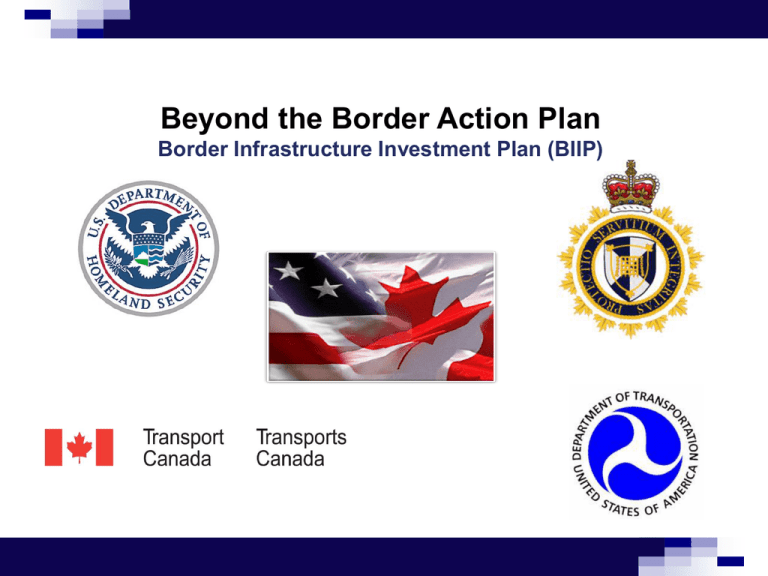
Beyond the Border Action Plan Border Infrastructure Investment Plan (BIIP) Defining Success • Success is defined by bi-national transportation and customs infrastructure improvements that enhance cross-border trade, travel, and border security • These improvements will help to ensure that our border infrastructure has the capacity to properly support and complement the efficiencies gained through other initiatives that fall under the broader vision for perimeter security and economic competitiveness • To arrive at these infrastructure improvements, the U.S. and Canada will jointly develop and sustain a five-year Border Infrastructure Investment Plan (BIIP) that will be renewed annually. Defining Success The U.S. and Canada will coordinate plans for investment in physical infrastructure upgrades at key crossings including the following (in alphabetical order) • • Initial Canadian priority crossings: • Emerson, Manitoba • Lacolle, Quebec • Lansdowne, Ontario • North Portal, Saskatchewan • Peace Bridge, Ontario • Infrastructure investments at these locations are subject to the availability of funds Initial U.S. priority crossings: • Alexandria Bay, New York • Blue Water Bridge, Michigan • Lewiston Bridge, New York • Peace Bridge, New York Economic Benefits • This initiative, along with several other initiatives under the Beyond the Border Action Plan, is designed to benefit the integrated economies of Canada and the U.S. which depend on the fluid movement of commercial and non-commercial traffic across our borders. • Modernization of major border crossings will provide the following long-term economic benefits: reduced wait times; increased reliability of just-in-time shipments; and, decreased fuel consumption and greenhouse gas emissions, due to less engine idling at the border. Project Critical Path • The first annual Border Infrastructure Investment Plan is currently at the final approval stage in both countries. • The U.S. and Canada would then seek the necessary resources needed to implement specific projects identified in the plan. • Performance measures will include increased capacity at border crossings, reduced wait times, and decreased greenhouse gas (GHG) emissions, due to less engine idling at the border. Linkages with Other Initiatives • This initiative, which specifically targets border infrastructure, is one of several complementary initiatives designed to facilitate crossborder trade, travel, and security. Efficiencies gained through this initiative will support and work in tandem with the following: Small and Remote Ports of Entry; Border Wait Time Technology; Pre-Inspection and Preclearance; Enhanced Trusted Trader and Trusted Traveler; and, Harmonized Benefits to NEXUS Members. Stakeholders • Stakeholder consultations have been undertaken to inform the first BIIP and this approach will be followed for future updates BIIP. • Consultations with states, provinces and public border operators took take place through the Transportation Border Working Group (TBWG) and separately. • Once the upgraded border crossings are fully operational, stakeholders should benefit from increased physical capacity for both commercial and passenger traffic at the border, and decreased border wait times. 2nd Annual BIIP Report Introduction • Major Border Crossings (focus of BIIP) (25) • Medium-Sized Border Crossings (34) (planned/proposed infrastructure improvements noted) • Small And Remote Ports (consensus recommendations on improvements) (62) • Next Steps 2nd Annual BIIP Report Schedule • Outline of Report – Nov. 7, 2012 • Expanded Outline of Report - April 2013 • TBWG Comments – April to July 2013 • Review by Agencies • Final Report – Sept. 30, 2013 Next Steps • Improving our cross-border infrastructure is a long-term process. As other projects are identified, they will be addressed in annual updates. • A key success factor will be securing the necessary Canadian, U.S. Government and other stakeholder funding for identified, and future, projects. Discussion Topics – Explore Innovative Finance • • • • Public Private Partnerships (PPP) TIFIA Loans (lower cost loans) Trust Funds Shared Cost – Reduce Need for Infrastructure – Impact of New Technology – Funding Future Bridge Needs – Other
